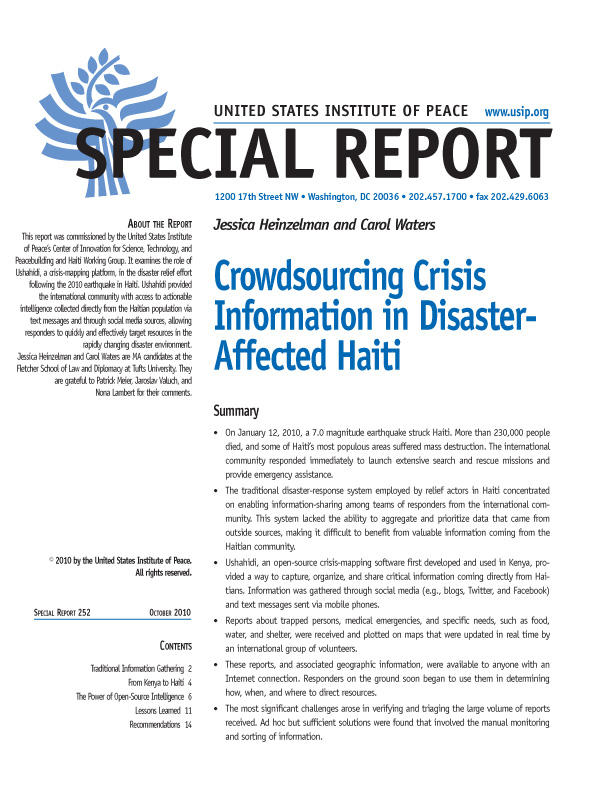Crowdsourcing Crisis Information in Disaster- Affected Haiti
This report was commissioned by the United States Institute of Peace’s Center of Innovation for Science, Technology, and Peacebuilding and Haiti Working Group. It examines the role of Ushahidi, a crisis-mapping platform, in the disaster relief effort following the 2010 earthquake in Haiti.

Summary
- On January 12, 2010, a 7.0 magnitude earthquake struck Haiti. More than 230,000 people died, and some of Haiti’s most populous areas suffered mass destruction. The international community responded immediately to launch extensive search and rescue missions and provide emergency assistance.
- The traditional disaster-response system employed by relief actors in Haiti concentrated on enabling information-sharing among teams of responders from the international community. This system lacked the ability to aggregate and prioritize data that came from outside sources, making it difficult to benefit from valuable information coming from the Haitian community.
- Ushahidi, an open-source crisis-mapping software first developed and used in Kenya, provided a way to capture, organize, and share critical information coming directly from Haitians. Information was gathered through social media (e.g., blogs, Twitter, and Facebook) and text messages sent via mobile phones.
- Reports about trapped persons, medical emergencies, and specific needs, such as food, water, and shelter, were received and plotted on maps that were updated in real time by an international group of volunteers.
- These reports, and associated geographic information, were available to anyone with an Internet connection. Responders on the ground soon began to use them in determining how, when, and where to direct resources.
- The most significant challenges arose in verifying and triaging the large volume of reports received. Ad hoc but sufficient solutions were found that involved the manual monitoring and sorting of information.
About the Report
This report was commissioned by the United States Institute of Peace’s Center of Innovation for Science, Technology, and Peacebuilding and Haiti Working Group. It examines the role of Ushahidi, a crisis-mapping platform, in the disaster relief effort following the 2010 earthquake in Haiti. Ushahidi provided the international community with access to actionable intelligence collected directly from the Haitian population via text messages and through social media sources, allowing responders to quickly and effectively target resources in the rapidly changing disaster environment. Jessica Heinzelman and Carol Waters are MA candidates at the Fletcher School of Law and Diplomacy at Tufts University. They are grateful to Patrick Meier, Jaroslav Valuch, and Nona Lambert for their comments.


